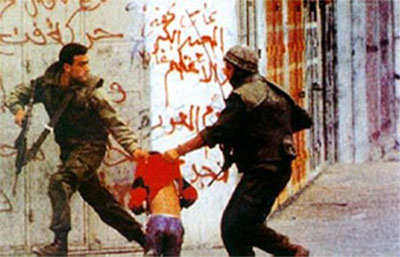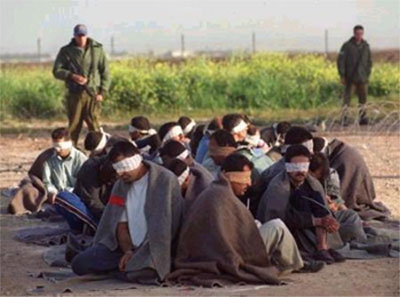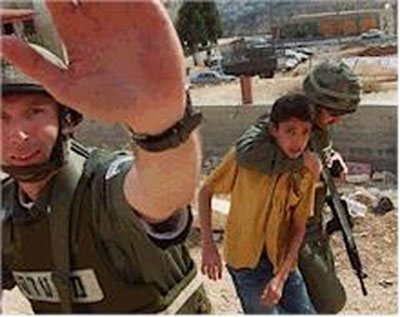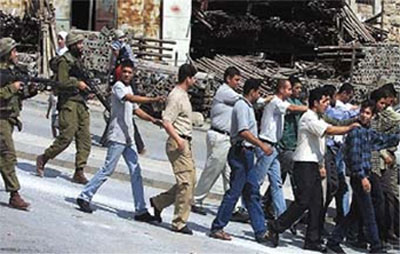MORE THAN HALF the Palestinians population—53 percent—are children under the age of 17. The majority of Palestinians, therefore, consist of the community’s most vulnerable members. Not only are they in a crucial stage of physical and mental development, but they are a direct target of Israeli military violence. As the fourth generation of Palestinian trauma, moreover, they are the bearers of the accumulated heavy inheritance of national loss. No wonder, then, that the current four-year-old crisis is raising grave concerns about the present and future of the children of Palestine.
With the exception of recent media reporting of the latest Israeli atrocities in Gaza, which killed 35 children, more than a third of the total number of victims, the plight of Palestinian children is unknown to people following our crises on television. Media reports typically slander our children’s reputation, character, culture and even religious principles, or treat them as mere statistics. The reality of our young ones’ lives is invisible in international news coverage.
Instead, the media portray Palestinian children as unloved by their families, who push them into harm’s way to achieve political gain or use them for economic reasons. Palestinian fertility is treated as an epidemic; our culture is stereotyped as one of violence and hatred. Even though it is not we who are the world’s producers of horror movies and war games, as the conflict seeps into every aspect of our children’s lives, as our kids become more accustomed to the noise of bombardment than to the singing of birds, as violence permeates our homes, schools and public places, it is no wonder that our kids invent their play from such reality. The soldiers versus the intifada boys is the game played in almost all Palestinian homes.
Attesting to Israel’s deliberate targeting of children is the fact that 20 percent of the total number of intifada victims were children going about their normal daily activities such as going to school, playing, shopping, or simply being in their homes or yards. They were killed and injured in Israeli air and ground attacks, by indiscriminate fire from Israeli soldiers, or by being shot by IDF snipers. Indeed, among those children injured, 45 percent were wounded in the upper parts of their bodies—in their heads, necks or chests—while other were shot from behind, or in their eyes and knees to permanently handicap them without increasing the number of those killed.
Recent international studies have concluded that 40 percent of the children living in the West Bank and Gaza are anaemic, while 23 percent suffer from chronic or acute malnutrition. This predisposes them to contract life-threatening diseases, affects their intelligence and vastly increases the rate of attention deficit disorder. Women who were malnourished in their youth have increased rates of premature birth and high blood pressure in pregnancy.
Israel’s wall and siege have affected our children’s’ schooling. A significant drop-out rate has been correlated with oppressive Israeli measures. Not only have Palestinian students been killed, injured, and arrested, but Israeli occupation troops have shelled and attacked hundreds of schools, closed several, turning them into military bases, and hindered teaching at many others. Children and teachers on the way to school are routinely tear-gassed, harassed, or present when soldiers open fire. All of this, needless to say, affects the quality of instruction and a child’s ability to perform well once in class. Additional factors such as increasingly stressful home environments and Israeli military raids on residential neighborhoods exacerbate the difficult situation.
Our children also suffer from an increasing poverty rate. A staggering 66.5 percent of Palestinians live below the poverty line. Unemployment has risen to more than 65 percent of the labor force. Consequently, large numbers of children are forced to play an adult role and work to help their families survive. An estimated 2.3 percent of Palestinian children between the ages of 10 and 17 years old are working. One hears poignant stories of children dropping out of school due to difficult economic circumstances that force them to sneak through mountains and valleys to reach Jerusalem, where they can sell cigarettes and water bottles at the road junctions for little gain.
Our children are also among those who suffer in Israeli prisons. Israel currently holds 370 children, including some as young as 11 years old, in its detention centers and prisons, and a further 209 turned 18 while imprisoned. Testimonies gathered from child prisoners, and confirmed by local and international human rights organizations, indicate that from the moment of arrest and throughout their incarceration these children are subjected to a systematic pattern of physical and psychological abuse, often amounting to torture. Such abuse includes being beaten, tied in contorted positions for extended periods of time, deprived of food and sleep, and being threatened and humiliated. Family and attorney visits regularly are obstructed or denied.
Israel’s subjection of Palestinian children to killing, torture and dislocation is flagrant and touches every aspect of their lives. Its blatant violation of the 1989 Child Rights Convention and the 1949 Fourth Geneva Convention has raised the concerns of local researchers, academics, and governmental and non-governmental institutions, especially in the area of mental health.
Some studies suggest that psychological trauma has affected more than 68 percent of Palestinian children, arresting their normal psychological, mental and social development. As a medical doctor specializing in psychiatry, I have made the following notes based on my limited observations and impressions while working in Palestine.
Many children were brought to pediatric and psychiatric clinics suffering from symptoms attributable to their direct involvement or witnessing of political violence. They exhibited symptoms of depression, such as feeling sad, lonely and desperate, and physical signs such as loss of appetite. Others showed signs of anxiety, such as feeling sick and worried, or having pains all over their body thinking of bad and frightening things. Some complained of sleeping difficulties, such as having nightmares and bad dreams, fear of the dark, or waking up frequently during the night. Cognitive problems were manifested in poor school performance, reading, and writing, or in having difficulty concentrating and remembering. Symptoms of aggression included difficulty controlling hostility, destructive behavior, and quarrelling and fighting with adults and peers.
Despite the trying circumstances of their lives, however, Palestinian children also exhibit resilience. Examples include students’ participation in cleaning up the rubble from the demolition of a friend’s home, visiting an injured colleague, taking an active role in peaceful demonstrations, and alternative education, when they continue to go to school against all the obstacles.
One survey showed that while 85 percent of children surveyed believe that the political situation is unlikely to improve, 90 percent responded that personal and academic ‘’self-improvement’’ was their main way of coping with the current situation and preparing for the future.
Even though our children’s suffering will continue as long as Israel occupies our land, it is essential that in the meantime we provide to the best of our ability the conditions necessary for their healthy development, such as stability, security, recreation, and sound nutrition. What is needed instead is public awareness and organized efforts to protect them from the dangers that surround them.
This can be done on two levels: first by lessening their isolation—by developing “adoption” and friendship programs with people in the outside world, for example, including Palestinians in the Diaspora and understanding people in the international community. This will not only help our children morally and intellectually, but will let them know there are people living outside Israel’s walls who think about them and communicate their love to them. This will also help our children to communicate better themselves, through arts, languages and modern technology.
Palestinian children living under occupation also should be urged to take action. During the first infifada, those who participated in active resistance against Israeli soldiers were found to have fewer symptoms than those who did not, and had better coping abilities than those who felt helpless and stayed at home.
At the societal level, Palestinians need a sense of collectiveness, especially following the death of their leaders. Palestinians already have a remarkably strong social fabric and family solidarity. Despite all the poverty, our people don’t search for their food in trash cans, and no one sleeps in the street, despite the hundreds of homes demolished. Since it also was found during the first intifada that children who had warm and supportive experiences with their parents had fewer symptoms, an effective welfare system would have a positive effect on the whole society.
Commitment to an ideology and an understanding of why events occur can be an important contributor to steadfastness, enabling people of principle and ideology to better cope with difficult times.
It is hard not to wonder whether Israel’s targeting of Palestinian children is deliberately designed to create a traumatized future generation, passive, confused and incapable of resistance. It is no secret, after all, that psychological trauma is not a temporary crisis but a phenomenon with long-term effects that will become more prominent as the physical injury subsides. Clearly, it will take many years to mitigate the damage inflicted on our next generation. Still, and even more than ever, our children represent our hopes.








